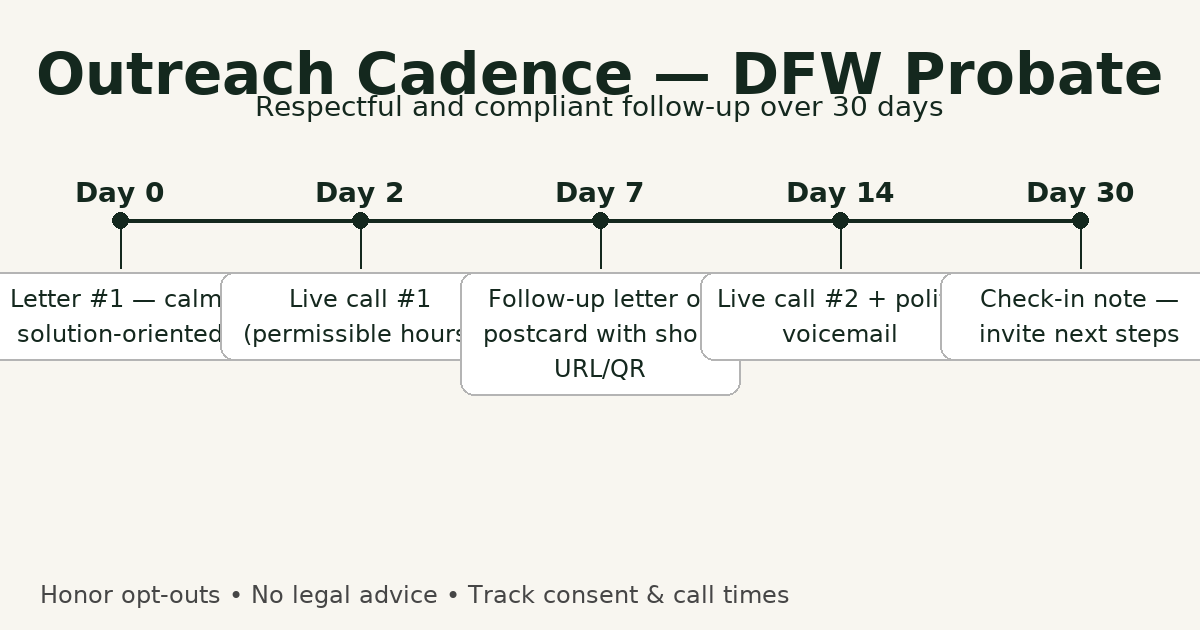
DFW Probate Leads: Where to Find Them and How to Approach Executors
Here’s the playbook—no fluff. Probate deals take tact, timing, and consistency. You’ll pull the right records, build a simple tracking sheet, contact executors with respect, and follow a cadence that gets replies without crossing lines. Do this right and you’ll build a reliable DFW pipeline.
1) What probate is and why timing matters
Probate is the legal process of settling a deceased person’s estate—identifying assets, paying debts, and distributing what’s left to heirs. In practice, real property can become a headache for families: mortgage payments, taxes, maintenance, and decisions among siblings. That’s where you help—clear options and clean execution.
- Why it works: estates often need speed, certainty, and “as-is” convenience—your offer provides relief.
- Timing window: new filings → executor appointed → decisions on property. Your outreach should begin when filings appear and continue (politely) through appointment and early administration.
- Mindset: compassion first, clarity second, price third.
2) Records to request and where to pull them
You want filings that indicate: decedent, executor/administrator, and property ties. Across Dallas and Tarrant counties, start with:
- Probate docket/case search (by county): new probate applications, letters testamentary/administration, independent administration.
- Real property records (clerk): deeds, affidavits of heirship, transfers on death, and recent filings tied to the decedent.
- Appraisal district (CAD): owner name, mailing address, situs address, exemptions, and assessed values.
Build your sheet: Decedent Name • Case # • Executor/Administrator • Mailing Address • Situs Address • APN • Filing Date • Notes • Status (New → Verified → Contacted → Warm → Do Not Contact → Dead → Under Contract).
3) Sensitivity, ethics, and best practices
- Lead with empathy: acknowledge the situation; keep letters plain and respectful—no hype.
- Don’t pressure: offer options (you buying, agent listing, hold/rent, or help connecting with resources).
- Be accurate: never imply legal advice; point to title/attorney for specifics.
- Be available: a real phone number, quick replies, clear next steps.
4) Scripts that open doors
Warm letter (short):
I’m sorry for your loss. I work with local families who need a simple, as-is option for a property. If it helps, I can view the home, share clear numbers, and handle the heavy lifting with title. No obligation at all. If you’d like to talk, call/text me at (469) 909-1851.
Live call opener:
Hi <Name>, my name is Moe. I’m local and I help families who are navigating probate with a property. I’m not a broker. If it’s useful, I can look at the house as-is, share what it would sell for today, and make a simple cash offer. Would it be okay to ask a couple of quick questions?
Polite decline/deferral (relationship saver):
Understood. I’ll note that now isn’t a good time. If plans change, I’m here to help—no pressure. Would it be okay if I check in once in a few weeks?
5) Follow-up cadence (email, mail, phone)
Consistency beats clever. Keep it steady for 30 days, then slow down if there’s no response.

- Day 0: Letter #1 (solutions, calm tone). Create a dedicated callback number.
- Day 2: Live Call #1 (during permissible hours). If no answer, one normal voicemail.
- Day 7: Follow-up letter or postcard; include a short URL/QR to schedule a call.
- Day 14: Live Call #2 + polite voicemail.
- Day 30: Brief check-in note; invite next steps if helpful.
6) Compliance notes for Texas
- Not legal advice: you are not an attorney; encourage families to consult counsel and title.
- Calls & texts: honor Do Not Call rules, maintain your internal DNC list, and avoid marketing texts without prior express written consent.
- Truthful marketing: don’t present as an agent unless you are licensed and operating accordingly; disclose relationships if applicable.
- Recordkeeping: track consent, opt-outs, and call times.
Internal resources:
Download the Probate Script Pack
Letters, live call openers, objection handling—keep it respectful and effective.

Leave a Reply